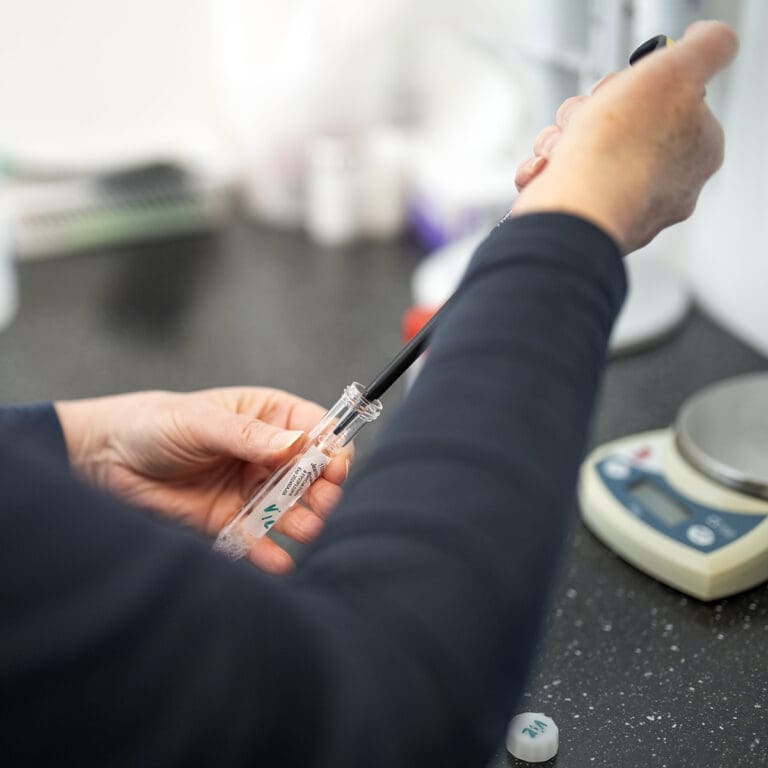
Treatment methods
Insemination treatment is the least invasive treatment where the sperm is inserted directly into the uterus. This is done using a thin catheter at the exact time of ovulation.
In the IVF-treatment (in vitro fertilisation), the eggs are removed from the woman with a thin needle under local anaesthetic and fertilised with sperm in the laboratory. 2-5 days after the egg retrieval, one fertilised egg is placed back into the uterus and the rest of the fertilised eggs can be frozen if they are suitable.
ICSI (intracytoplasmic sperm injection) Hormone stimulation and egg retrieval is done in the same way as IVF treatment, but here fertilisation is achieved by an embryologist using a very thin needle to insert a sperm cell into each egg. This technique is used if the man has very poor sperm quality or if there has been a history of impaired fertilisation with IVF treatment.
Worth knowing
You probably have many questions about fertility treatment. Here we answer some of the basic questions that many people have before starting fertility treatment.
Who can receive fertility treatment?
Couples, singles and lesbian couples can receive fertility treatment with us.
In order to be treated, the law requires that you do not have HIV or Hepatitis B and C (infectious liver disease). Therefore, everyone is tested with a blood sample before treatment.
Access to assisted reproduction: IVF treatment and insemination treatment are regulated by the Assisted Reproduction Act. Among other things, the law requires an assessment of whether the couple/woman will be able to provide the necessary care for a child after birth (parental fitness).
When should I seek help?
In general, the recommendation is to try at home for one year if the woman is under 35 years old and there are no proven reasons for infertility.
The causes for the woman can be:
- Closed fallopian tubes
- Menstrual disorders e.g. PCO
- Early menopause for the woman’s mother
- Previous inflammation of the genitals
The cause for the man can be:
- Reduced sperm quality
- Lack of testicular descent in childhood
If there is an explanation for infertility as described above, you should of course seek help immediately.
The woman’s age
Age is a very important factor in fertility treatment. In Denmark, it is legal to receive fertility treatment until the woman turns 46. If you are under the age of 46, you are welcome in our clinic.
Women are born with a certain pool of eggs and from the first menstruation until menopause, the eggs mature in the menstrual cycle each month and are either fertilized or rejected. So, as the woman gets older her egg reserve decreases and unfortunately the proportion of eggs with chromosomal defects increases. This also means that the chance of having a live and healthy child decrease, while the risk of a miscarriage increases.
Research shows that women’s fertility already starts to decline at the age of 25. Therefore, the recommendation is not to wait too long to have the children you want.
We offer 3 treatment packages for women up to the age of 42. If you are 43 years old or older, we offer single treatments. Some women/couples will need egg donation simply because of their age, which offers a very good chance of pregnancy. For this, we offer an egg donation package or our unique “Baby or money back” package.
See the price of the different packages and other treatments in our price list.
The woman’s BMI
You are welcome to come to an initial consultation at IVF-SYD so we can talk about your treatment options.
We recommend that your BMI is no higher than 35 at the start of treatment, but please contact us and let’s talk about your situation.
In general, a high BMI reduces the chances of pregnancy and increase the risk of miscarriages and complications during pregnancy and at birth.
Treatment at a private clinic
At a private fertility clinic, we are allowed by law to treat women until the age of 46. We are allowed to offer all types of fertility treatment, i.e. insemination treatment with the man’s sperm or donor sperm, IVF treatment with your own eggs or with donated eggs, and treatment with frozen fertilised and unfertilised eggs. Double donation is also legal if both egg and sperm donation is required.
At a private clinic, you pay for all treatments yourself, so we do not need a referral from your own doctor. Some private clinics have an agreement with the National Health Service and insemination treatment is free, but you still have to pay full price for IVF treatment.
A private fertility clinic usually has no or very short waiting times. At IVF-SYD, you can usually have an initial consultation within 3 weeks after which you can start treatment immediately. We do not refuse anyone who wants to start treatment (without a medical reason).
Many choose treatment at a private clinic because of the short waiting times, the close/attentive treatment programme, because they already have one or more children together or because the woman has turned 40.
Treatment in the danish public sector
Fertility treatment is offered at public fertility clinics to women who are referred before the age of 40 and no treatment is offered after the age of 41. A maximum of 6 IVF treatments are offered for the first child in the public sector.
Women who wish to become pregnant can be treated in the public sector with insemination treatment by a gynaecologist in private practice, regardless of the number of children, and the woman can be treated up to the age of 45. However, you should be aware that the chance of pregnancy with insemination treatment is less than 10% if the woman is 40-42 years old, while virtually no women achieve pregnancy with insemination treatment after the age of 43. In this case, IVF treatment or egg donation would be recommended.
Women with a BMI above 30 are generally not offered treatment at public hospitals. A high BMI reduces the chances of pregnancy and increases the risk of miscarriage and complications during pregnancy and labour. Some public fertility clinics will treat women with a BMI of 30-35, if the woman is over 35 years old or if there is low egg reserve (low AMH, elevated FSH).

PCOS
Have you been told or do you suspect you have PCOS?
Read more about PCOS here and what it means for your fertility wish.

Endometriosis
Do you have endometriosis and are you unsure what it means for your fertility wish?
We have extensive experience in treating women with endometriosis, as it is a relatively common condition among women of childbearing age.

Summer holiday 2025
The clinic is closed
for the summer holidays
from 12th – 27th of July
 Phone. +45 76 24 50 20
Phone. +45 76 24 50 20  info@ivf-syd.dk
info@ivf-syd.dk 